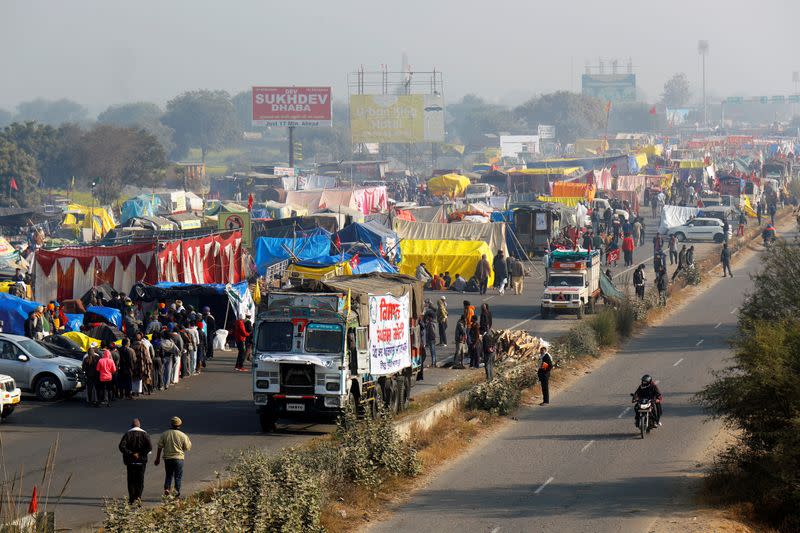By Devjyot Ghoshal and Manoj Kumar
SINGHU, India (Reuters) – In an impasse between barn farmers in northern India and the government that has convulsed the country, farmers have a 21st century ally: a handful of supporters around the world running a Twitter.
Farmers have paralyzed part of New Delhi’s incoming and outgoing traffic, protesting the recent agricultural laws that they fear may eliminate government-guaranteed minimum prices for their crops.
But the protesters, many of them from the Sikh religious minority, say they are also fighting a social media campaign by Prime Minister Narendra Modi’s Hindu-nationalist Party Bharatiya Janata (BJP). The BJP classifies some of the protesters as separatists from the giant multiethnic nation, an accusation that protesters call misinformation.
Bhavjit Singh was excited for the battle in November in his room in Ludhiana, in the state of Punjab, where he watched with dismay the online attacks on farmers.
With some friends, the information technology professional launched the @ Tractor2twitr Twitter account in late November. The following month, he traveled to the central protest site on a major highway that connects the state of Haryana and Delhi, the territory that includes the capital.
Thousands of people jammed the road for miles with tractors, trailers and tents, sleeping in makeshift huts and cooking in crumbling kitchens.
Singh, 38, joined the protesters with two smartphones.
“We are going to intensify our campaign because we are getting organized and receiving more support now,” Singh told Reuters, speaking near the noisy protest site where open kitchens served mid-morning snacks. “Our war of perception, the war of messages is going in the right direction.”
The account, with more than 23,000 followers, promotes its message by pushing a hashtag a day. Recently, #FarmersDyingModiEnjoying, promoted by @ Tractor2twitr, was among the top hashtags on Indian Twitter – fighting #ModiWithFarmers.
13,000 kilometers (8,000 miles) away in Houston, Texas, Baljinder Singh is part of the core group that helps manage the account.
The BJP “was targeting us, so we felt we had to respond,” the owner of some 7-Eleven stores in the United States told Reuters. “We are all sons and daughters of farmers.”
Baljinder and Bhavjit Singh, who share the same Sikh family name, are not related.
@ Tractor2twitr joined in the last few weeks a union group called Farmers Unity Front (Kisan Ekta Morcha), creating Twitter, Facebook, YouTube, WhatsApp and Snapchat accounts, with a team of 50 volunteers, which reached hundreds of thousands of followers .
‘HANDLED MEDIA’
Farmers demand that Modi repeal the three agricultural laws, enacted in September, which they said could make them vulnerable to retail giants like Walmart Inc and India’s Reliance Industries.
The government says the laws, which allow producers to bypass government-regulated wholesale markets and sell directly to buyers, are a reform that gives producers more options. It sought to assure farmers that the guaranteed price system will not be dismantled.
As farmers marched to Delhi in late 2020, a wave of disinformation began to spread online, said Rajneil Kamath, editor of the fact-checking website Newschecker.
Old and unrelated images and videos – including some of demonstrations outside India calling for an independent Sikh homeland – were presented as representatives of farmers, Kamath said.
In December, Twitter flagged a tweet from the head of the BJP’s vast social media team, Amit Malviya, as “manipulated media”, saying that a video he posted showing an elderly protester avoiding police aggression was deceptively edited.
BJP spokesman Tajinder Pal Singh Bagga said the party has legitimately stressed that people other than farmers, including Sikh separatists, have potentially infiltrated the protests.
“We believe that some people are trying to hijack the movement,” said Bagga.
At the protest site, Ammy Gill, a 25-year-old lyricist from Punjab, divides her time helping out in community kitchens and narrating protests on social media.
“The purpose of our social media messages is to fight trolls and the campaign against farmers,” said Gill.
“We are not here for a picnic.”
(Reporting by Devjyot Ghoshal and Manoj Kumar in New Delhi; Editing by Sanjeev Miglani and William Mallard)
